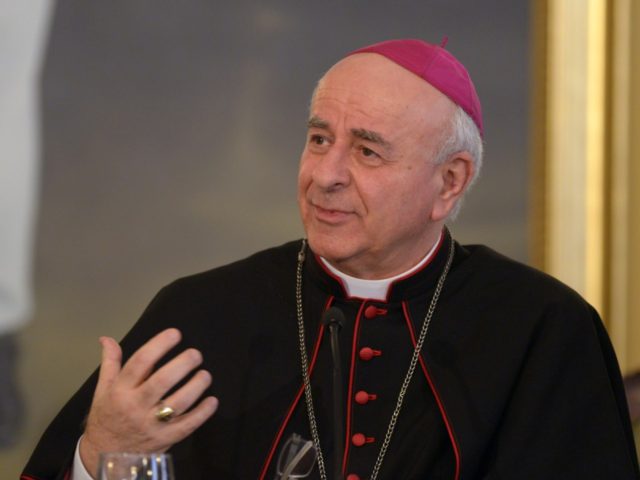ROME — Archbishop Vincenzo Paglia (pictured) laid off the core of the faculty of the John Paul II Institute for Marriage and the Family last month, a move critics claim was meant to radically alter the vision of the institute that was founded to spread the legacy of its namesake, especially his innovative theology of the body.
“It seems to me that the identity of the Institute is seriously threatened” by the recent changes, said the vice-president of the Institute, Fr. Jose Granados, insisting that it is necessary to “warn of the danger to the original mission of the Institute.”
The list of luminaries summarily sacked from their teaching positions is an impressive one, spanning from theologians of the caliber of Livio Melina and José Noriega, to the illustrious Stanislaw Grygiel, former student and later adviser to Pope Wojtyla, to Maria Luisa Di Pietro, Przemyslaw Kwiatkowski, Vittorina Marini and Monika Grygiel.
Despite his frequent preaching on “mercy,” Archbishop Paglia, who became an international media figure in 2017 for having commissioned a homoerotic fresco for the apse of the cathedral of Terni-Narni-Amelia, let his teaching staff go “brutally” and without prior notice, according to a reconstruction of events by Italian media, which did not hesitate to speak of a “betrayal.”
Late last August, former papal nuncio to the United States, Archbishop Carlo Maria Viganò, released a shocking 11-page report in which he linked the clerical sex abuse crisis as well as cover-ups by bishops to an extensive “homosexual network” in the Church, among whose leaders he named Archbishop Paglia.
“These homosexual networks, which are now widespread in many dioceses, seminaries, religious orders, etc., act under the concealment of secrecy and lies,” he said, “and strangle innocent victims and priestly vocations, and are strangling the entire Church.”
According to Viganò, two Pope Francis appointees, Cardinal Francesco Coccopalmerio and Archbishop Vincenzo Paglia, “belong to the homosexual current in favor of subverting Catholic doctrine on homosexuality.”
New statutes for the institute, approved last month, centralize decision-making power in the hands of the school’s grand chancellor, Archbishop Paglia, while decreasing the contribution of the teaching faculty, Father Granados told Catholic News Agency.
“If the procedure is carefully examined, it will be almost impossible for the faculty to oppose a candidate promoted by the Grand Chancellor,” Granados said in reference to the hiring of new teachers.
The recent dismissal of faculty members “of great importance in the history of the Institute… has left us dumbfounded,” Granados added.
A group of some 150 students of the Institute wrote a letter to the president of the institute, Msgr. Pierangelo Sequeri, copied to Archbishop Paglia, protesting the reconfiguration of the school. The letter now has 535 signatories, 370 of whom are or were students of the Institute.
“Saddened and disconcerted by the way in which we have been notified about the crucial changes that affect us directly as students, we would like to begin by expressing our greatest concern: the loss of the formational approach and, therefore, of the identity of the Pontifical Theological John Paul II Institute,” they stated.
Catholic intellectual George Weigel, the noted biographer of Pope John Paul II, also had harsh words for the move, which he compared to a second wave of Vandal attacks on Rome.
If Archbishop Paglia becomes a cardinal, Weigel wrote last week, “it will be as a reward for knee-capping scholars of impeccable scholarly credentials and personal probity, deeply beloved by their students.”
According to Mr. Weigel’s analysis, the gutting of the institute named after Saint John Paul is an act of “raw intellectual vandalism” undertaken by those who always opposed the Polish pope and his defense of Catholic theological orthodoxy.
Resistance to the magisterium of John Paul II “was deep-seated and bitter among those self-styled progressives,” Weigel wrote, who found themselves after the election of Karol Wojtyla in 1978, “on the outs in the great game of ecclesiastical politics – even though they continued to maintain an iron grip on most theological faculty appointments and on a lot of theological publishing.”
The John Paul II Institute in Rome, “as the hub of several affiliated institutes around the world, was a key instrument for deepening the entire Church’s reception of John Paul’s 1993 encyclical on the reform of the moral life, Veritatis Splendor,” Weigel wrote, and thus was despised by progressives who found their pet theories condemned by the encyclical.
If their project were to be revived, Weigel stated, “Veritatis Splendor and its teaching on the reality of intrinsically evil acts had to go.”
Now in power, such progressives have “abandoned argument and resorted to thuggery and brute force in order to win what they had failed to win by scholarly debate and persuasion,” he concluded.
As Weigel noted, Cardinal Angelo Scola himself, former rector of the Pontifical Lateran University, “described what is afoot in Rome o these days as ‘torpedoing’ the John Paul II Institute through an academic ‘purge.’”
Amid growing criticism, the directors of the John Paul II Institute made it known last week that for the time being, they will not be answering questions regarding the changes to the Institute’s charter or administrative decisions affecting faculty.
A spokesman for the Institute, Father Riccardo Mensuali, confirmed the decision.
“This unavailability is momentary,” he said, “because we want to be absolutely serious,” in answering questions raised.
“The institute remains desirous of giving exhaustive responses, but asks a few weeks’ time in the month of August in order to formulate adequate responses,” he said.

COMMENTS
Please let us know if you're having issues with commenting.